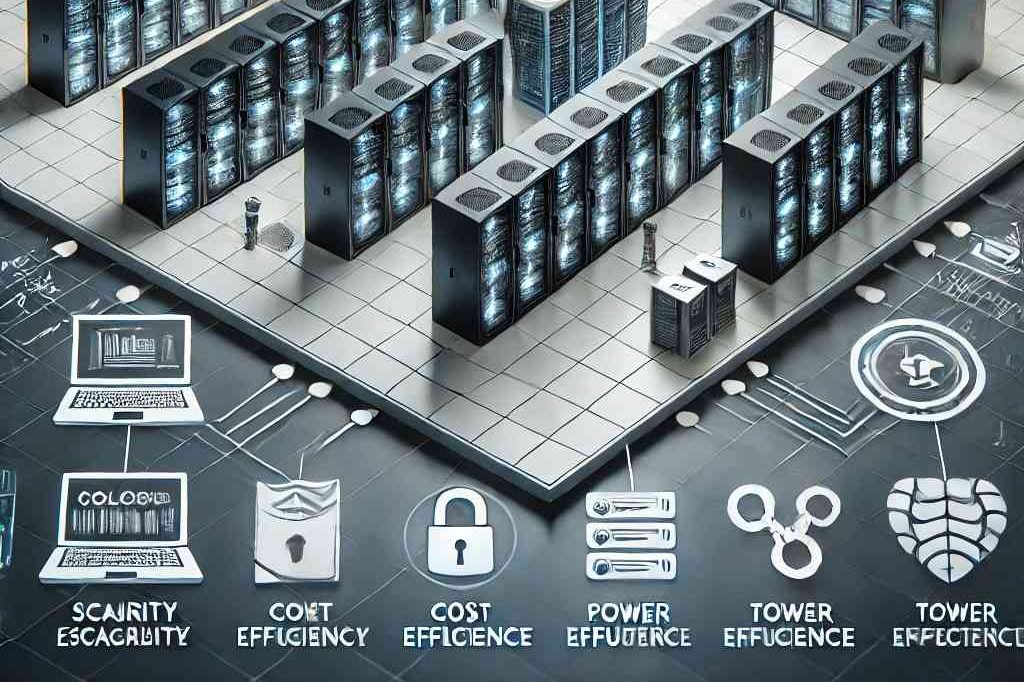18 September 2024
Why is Colocation Becoming an Important Factor for Companies?
The Need for Reliable and Efficient IT Infrastructure is a Top Priority for Many Companies
One of the solutions that continues to gain attention is colocation, a service where companies rent space in data centers to house their own servers and hardware. This service offers several significant benefits, making it an essential element in modern IT strategies. Why is colocation important for companies? Here are some of the key reasons.
1. Reliability and High Uptime
One of the main reasons companies choose colocation is to ensure that their servers and IT systems are always operational and running smoothly. Data centers offering colocation services are usually equipped with backup power systems, cooling, and protection from natural disasters and fires. These facilities typically have experienced technical teams to maintain optimal performance. These factors contribute to very high uptime levels, meaning companies can avoid downtime that could harm their business, especially for those relying heavily on online operations or systems that must function continuously without interruption.
2. Reduced Infrastructure Costs
Owning a data center can be very expensive. In addition to investing in the physical infrastructure, companies must also pay for maintenance, electricity, cooling, and security. By using colocation services, companies can share infrastructure with many other users, significantly reducing operational costs. Additionally, data center operational costs become more predictable through fixed subscriptions, making it easier for companies to plan their budgets.
3. Easy Scalability
As a company grows, its IT capacity needs often increase. With colocation, companies can easily add or reduce space and equipment in the data center according to their needs. This flexibility is essential for growing companies, allowing them to scale their IT infrastructure without the need to expand their own physical facilities. The ease of scalability also allows businesses to adjust resources as demand fluctuates, such as during sudden surges in data traffic.
4. Enhanced Security
Data and IT infrastructure security is a top priority for any company. Colocation data centers are typically equipped with advanced physical and network security measures, including biometric access controls, 24/7 CCTV surveillance, firewalls, and monitoring systems. With high levels of security, companies can ensure that their data is protected from physical and cyber threats. This provides additional assurance, particularly for businesses operating in highly regulated industries such as finance or healthcare, where compliance with security standards is crucial.
5. Efficient Management
By renting colocation facilities, companies do not have to worry about the day-to-day maintenance of the data center infrastructure, such as power management, cooling, or physical security. All of this is managed by the service provider, allowing the company's IT team to focus on more critical tasks, such as application development or service improvements. With colocation services, businesses can benefit from highly reliable infrastructure without having to allocate internal resources to manage it directly.
6. Access to Better Infrastructure
Colocation data centers are often connected to multiple internet service providers (ISPs), allowing companies to choose providers that offer the best connectivity. This is crucial for improving network speed and reliability, especially for companies that rely on digital and cloud services. Access to better networks can enhance overall business performance.
In addition to allowing companies to focus on their core business without worrying about physical infrastructure, there are several other reasons why colocation services are a beneficial solution:
1. Access to the Latest Technology
Colocation services are often equipped with the latest technology, which is continually updated by data center service providers. Companies using colocation can directly access advanced technology, such as next-generation servers, faster data storage systems, and more reliable networks, without having to make significant investments. As a result, businesses can remain competitive in the market with cutting-edge technology without incurring high costs for independently upgrading their infrastructure.
2. Redundancy and Disaster Recovery
Colocation typically provides redundant infrastructure, including backup power, dual internet connections, and protection against physical disruptions like fires or earthquakes. Well-managed colocation data centers also have disaster recovery plans in place, allowing businesses to recover data and systems quickly after an incident. This additional assurance helps companies maintain business operations smoothly during emergencies.
3. Improved Performance and Global Connectivity
Colocation often offers low-latency connectivity and access to robust international network providers. Companies operating in multiple global locations can leverage faster, more reliable connections, ultimately improving the performance of their applications and digital services worldwide. This is a significant advantage for companies with numerous branches or international customer bases.
4. Compliance with Regulations
Many industries, such as banking, healthcare, and government sectors, are subject to strict regulations regarding data storage and management. Colocation data centers typically comply with stringent security and regulatory standards, such as ISO 27001, PCI-DSS, or HIPAA, ensuring that companies also meet these requirements without needing to audit their infrastructure. This not only saves time but also reduces the cost of legal compliance.
5. Energy Efficiency and Eco-Friendliness
Modern colocation data centers are often designed with high energy efficiency. They use energy-efficient cooling and power management technologies, which not only reduce carbon footprints but also lower operational costs for tenants. Companies aiming to implement environmentally friendly policies can benefit from these efficiencies while keeping their IT operations effective.
In conclusion, colocation has become an important solution for companies in the digital era as it offers reliability, cost reduction, security, and flexibility that are essential in managing IT infrastructure. By leveraging colocation services, businesses can focus on their core operations without worrying about the physical infrastructure that supports them. For many companies, colocation is a strategic step that enables them to grow efficiently in an increasingly competitive and technology-dependent business environment.
Is this information helpful?
